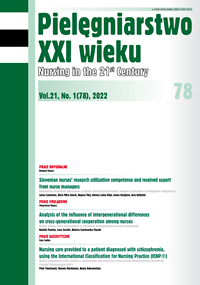Nursing care provided to a patient diagnosed with schizophrenia, using the International Classifi cation for Nursing Practice (ICNP®)
DOI:
https://doi.org/10.2478/pielxxiw-2022-0001Keywords:
nurse, schizophrenia, INCP®Abstract
NURSING CARE PROVIDED TO A PATIENT DIAGNOSED WITH SCHIZOPHRENIA, USING THE INTERNATIONAL
CLASSIFICATION FOR NURSING PRACTICE (ICNP®)
Introduction. Schizophrenia spectrum disorders are a major challenge for modern psychiatry. Epidemiological data indicate an increasing trend in the prevalence of such disorders, as well as other disorders from the schizophrenia spectrum. In a long-term perspective, this means that highly specialised (both nursing and medical) care, broadly understood community care, and innovative rehabilitation methods able to reduce cognitive and executive defi cits will be necessary.
Aim. The aim of this paper is to propose the use of the International Classifi cation for Nursing Practice (ICNP®) in the process of diagnosing and planning care for patients with schizophrenia.
Material and method. The paper is based on the individual case study method and for the analysis of the obtained data the following research techniques were used: interview, observation, measurement, documentation analysis. The research tools: Individual Nursing Care Card, Mental Health Assessment Card, SAD PERSONS Scale for Suicide Risk Assessment, Beck Depression Inventory (BDI), Global Assessment of Functioning (GAF), Hospital Anxiety and Depression Scale (HADS), and C-HOBIC Fatigue Assessment Scale.
Results. The collected data allow the formulation of 15 diagnoses in accordance with ICNP®. For the three selected diagnoses, a nursing care plan was drawn up, which included, depending on the patient’s needs, nursing interventions.
Conclusions. ICNP® as a classifi cation of nursing diagnoses allows the drafting of nursing diagnoses related to the mental state of
References
1. EZOP Polska: Kondycja psychiczna mieszkańców Polski: raport z badań „Epidemiologia zaburzeń psychiatrycznych i dostęp do psychiatrycznej opieki zdrowotnej – EZOP Polska”, red. Moskalewicz J, Kiejna A, Wojtyniak B. Warszawa: Instytut Psychiatrii i Neurologii. 2012, s. 267-270.
2. Bażydło M, i wsp. Osamotnienie pacjenta psychiatrycznej opieki zdrowotnej.
Psychiatr. Pol. Online First. 2018; 101: 1-14.
3. Vrbova K, et al. Positive and negative symptoms in schizophrenia and their relation to depression, anxiety, hope, self-stigma and personality traits – a cross-sectional study, Neuro Endocrinology Letters. 2018; 39(1): 9-18.
4. Kilańska D. Międzynarodowy standard opieki pielęgniarskiej – wprowadzenie do praktyki pielęgniarskiej [in:] Międzynarodowa Klasyfi kacja Praktyki Pielęgniarskiej. ICNP® w praktyce pielęgniarskiej red. Kilańska D. Warszawa: Wydawnictwo Lekarskie PZWL. 2014, s. 25-35.
5. Międzynarodowa Klasyfi kacja Diagnoz Pielęgniarskich ICNP® w wersji on-line: www.icn.ch/what-we-do/projects/ehealth/icnp-browser?fbclid=IwAR3xuSX
58DZ5HTfPXzoB0jvZG75F4ff Wr5FEUIwXKAS1eIXbG7_mfXDm0xo [accessed on
15.07.2019].
6. https://www.icn.ch/what-we-do/projects/ehealth-icnp/about-icnp/icnpcatalogues [accessed on 15.07.2019].
Downloads
Published
Issue
Section
License
Copyright (c) 2022 Authors

This work is licensed under a Creative Commons Attribution 4.0 International License.




